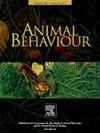雏鸟能闻到父母的气味吗?没有证据表明岸鸟能通过嗅觉识别父母
IF 2.3
2区 生物学
Q2 BEHAVIORAL SCIENCES
引用次数: 0
摘要
在许多类群中,幼鸟可以通过嗅觉线索识别父母。然而这种可能性在鸟类中却被忽视了,因为长期以来人们一直认为鸟类的嗅觉很差。尽管有越来越多的证据表明鸟类利用气味进行交流,但只有两种初生鸟类记录了嗅觉识别父母的能力。至于早熟鸟类的雏鸟是否利用嗅觉识别父母,目前还不得而知。亲鸟识别对于前社会性物种尤为重要,因为雏鸟在孵化后不久就会离开巢穴,可能会失去与父母的联系并遇到其他同种成鸟。我们在野外进行了Y-迷宫试验,以测试前社会性岸鸟白额鸻的雏鸟是否能通过嗅觉识别父母。我们首先测试了雏鸟是否对陌生成鸟的气味(预油)比对照组(无气味)更感兴趣,其次测试了雏鸟是否对亲鸟的气味比陌生成鸟的气味更感兴趣。与对照组相比,雏鸟花在陌生成鸟气味上的时间一样多,而花在亲鸟气味上的时间也与花在陌生成鸟气味上的时间一样多。因此,我们没有发现任何证据表明雏鸟会对同种成鸟的鞘油气味产生反应,也没有发现雏鸟可以利用鞘油气味来辨别亲鸟。可能该物种的雏鸟可以分辨亲鸟和外来鸟的气味,但我们的实验未能检测到这一点,也可能它们依赖其他(如听觉)线索,或者它们不需要分辨亲鸟和外来的同种成鸟。本文章由计算机程序翻译,如有差异,请以英文原文为准。
Can chicks smell their parents? No evidence of olfactory parent recognition in a shorebird
In many taxa, young can recognize their parents using olfactory cues. Yet this possibility has been overlooked in birds, because they were long assumed to have a poor sense of smell. While evidence is growing that birds use odours to communicate, olfactory parent recognition has only been documented in two altricial bird species. Whether chicks of precocial species use olfaction to recognize parents is currently unknown. Parent recognition is particularly important in precocial species, as chicks leave the nest shortly after hatching, and may lose contact with their parents and encounter other conspecific adults. We conducted Y-maze trials in the wild to test whether chicks of a precocial shorebird, the white-fronted plover, Anarhynchus marginatus, can recognize parents via olfaction. We tested first whether chicks show a preference for the odour (preen oil) of an unfamiliar adult over a control (no odour), and second whether chicks show a preference for the odour of a parent over that of an unfamiliar adult. Plover chicks spent as much time with the odour of an unfamiliar adult as with the control, and as much time with the odour of a parent as with that of an unfamiliar adult. Therefore, we found no evidence that chicks react to the preen oil odour of a conspecific adult, nor that they can discriminate a parent using preen oil odours. It may be that chicks of this species can discriminate parental and foreign odours but that our experiment failed to detect it, that they rely on other (e.g. auditory) cues, or that they do not need to discriminate between parents and foreign conspecific adults.
求助全文
通过发布文献求助,成功后即可免费获取论文全文。
去求助
来源期刊

Animal Behaviour
生物-动物学
CiteScore
4.60
自引率
8.00%
发文量
236
审稿时长
10.2 weeks
期刊介绍:
Growing interest in behavioural biology and the international reputation of Animal Behaviour prompted an expansion to monthly publication in 1989. Animal Behaviour continues to be the journal of choice for biologists, ethologists, psychologists, physiologists, and veterinarians with an interest in the subject.
 求助内容:
求助内容: 应助结果提醒方式:
应助结果提醒方式:


